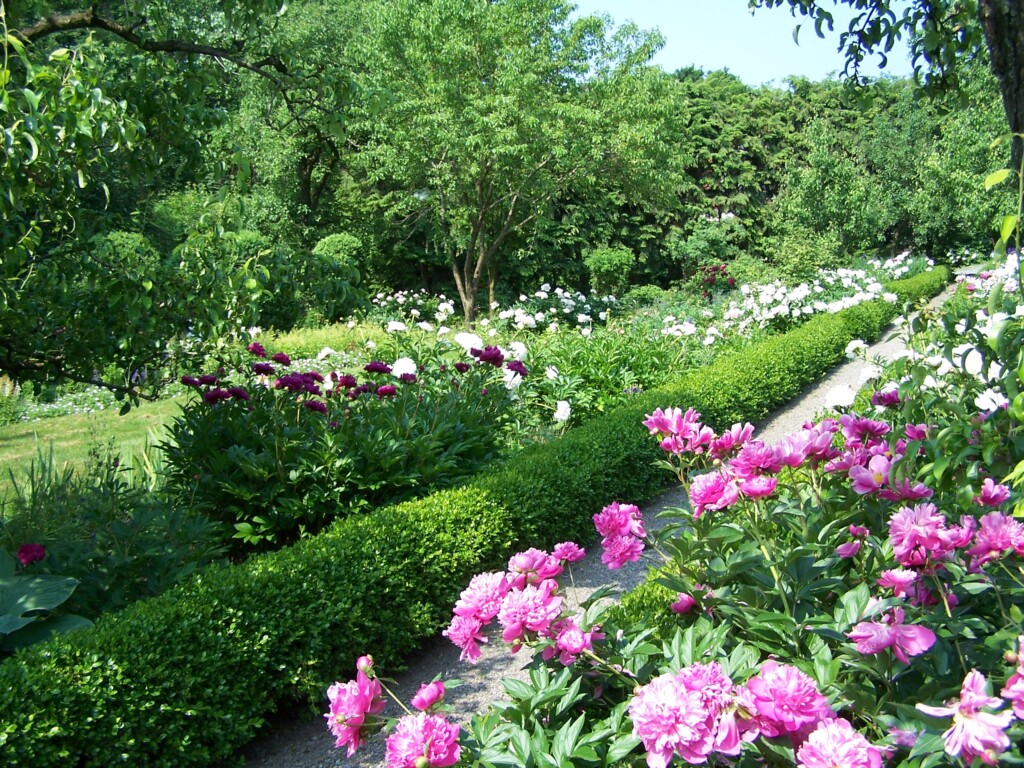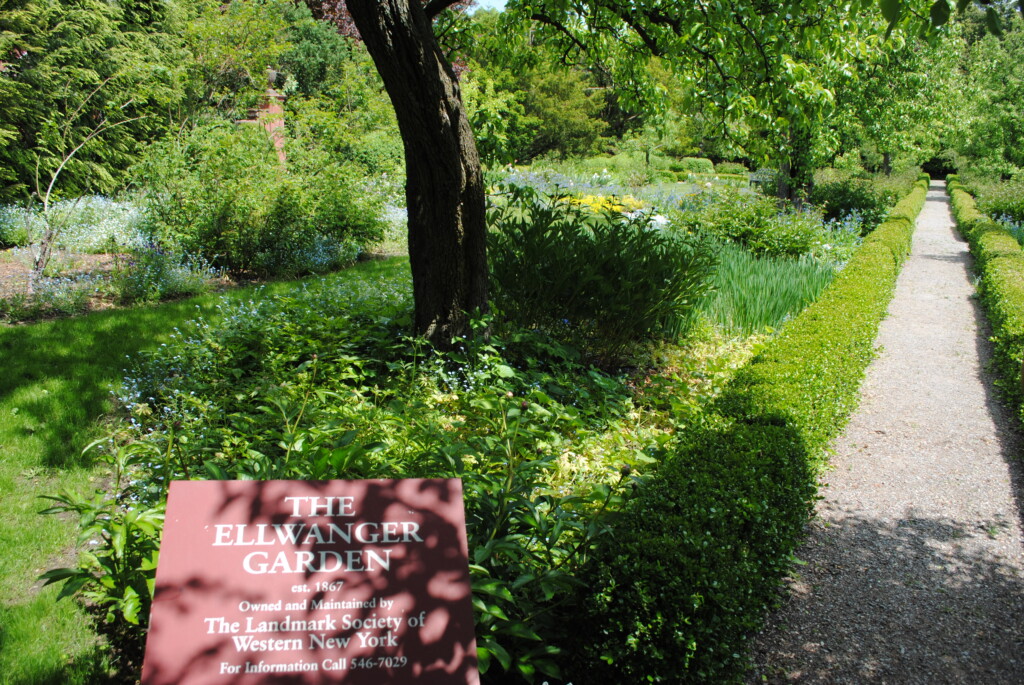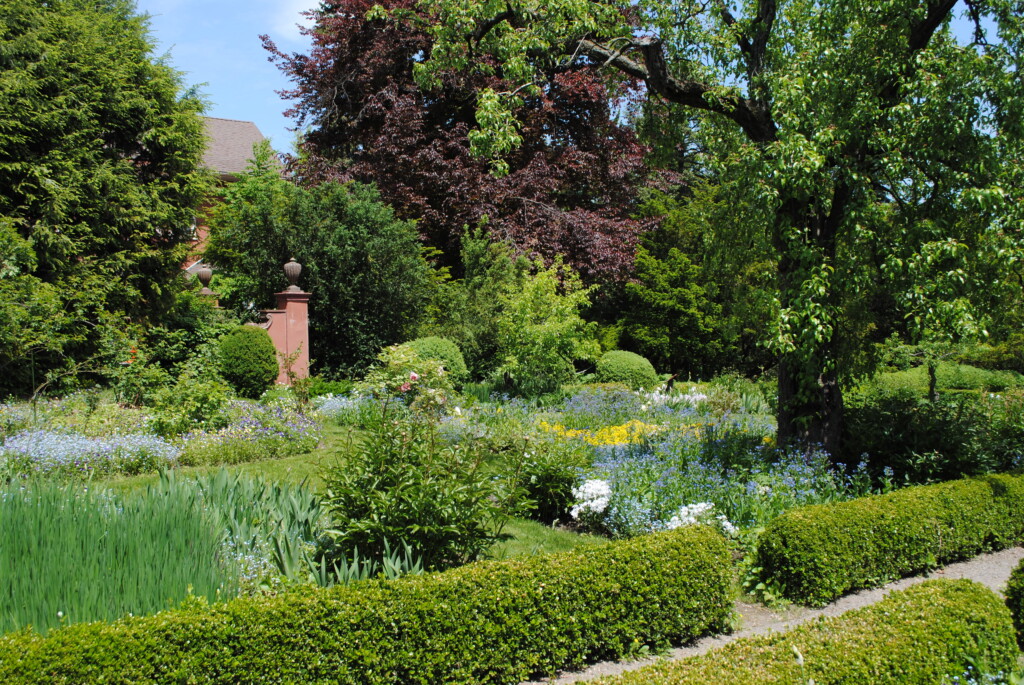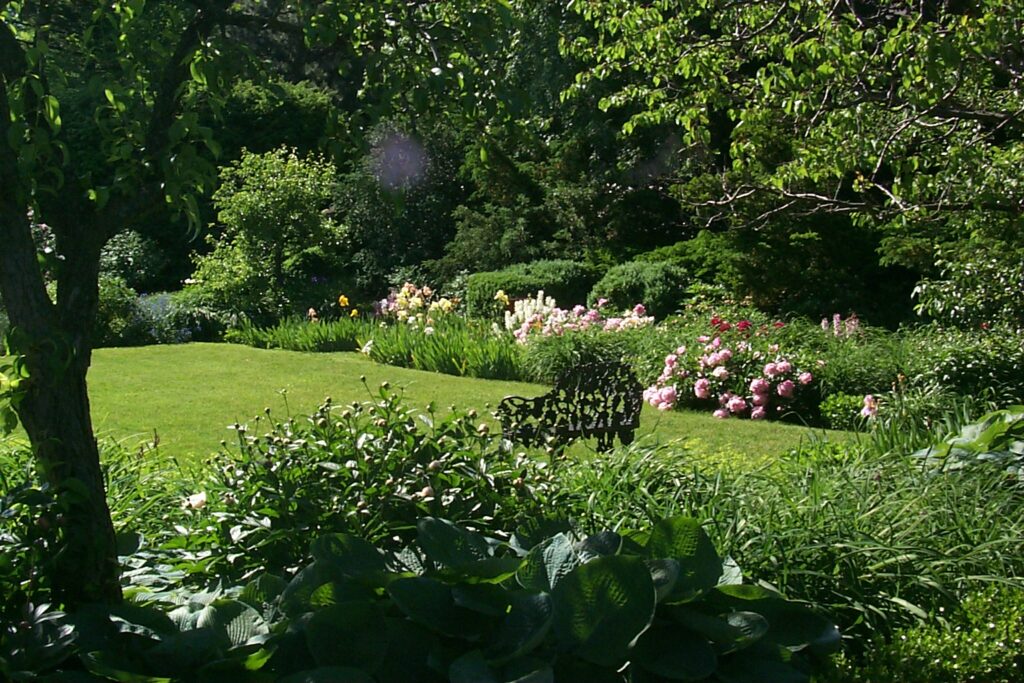If you’ve booked an “Elopement, Minmony, or Micro Wedding” at the Ellwanger Estate Bed and Breakfast at 625 Mt. Hope Avenue, you may already know about the adjoining garden behind the tall grey stone walls that edge the property. Far more are unaware of the historic Ellwanger Garden, measuring less than an acre, that opens to the public only four weekends every year in spring.
The Landmark Society of Western New York acts as caretaker for the 156-year-old garden. Organized in 1937, the society is one of the nation’s oldest historic preservation organizations and even precedes the founding of the National Trust for Historic Preservation. With a focus on “preservation, information, education, and advocacy,” it promotes historic properties, landscapes, or structures that need attention in its “Five to Revive” program, surveyed Rochester’s Jewish landmarks, and created LGBTQ and African American Landmarks Initiatives along with maintaining historic sites around the area, including the Stone-Tolan House, St. Joseph’s Park, and Warner Castle.
Cindy Boyer, director of the Society’s Public Programs, has the enviable job of working in the castle within walking distance of the garden.
“The Ellwanger Garden packs a lot in a very small space,” Boyer says. “It’s a large outdoor room in spring and summer, a living museum with some plants [dating back] 100 years. It’s a remarkable horticultural legacy started by the biggest industry of its time.” That industry was the Mt. Hope Botanical and Pomological Gardens founded in 1840 by German immigrant George Ellwanger with partner Patrick Barry, an Irish immigrant. Over time, the business expanded from eight acres to more than 650 acres. According to the Landmark Society’s website, in the 1870s it was “the largest and most respected horticultural firm in the country.”
“Ellwanger was the one who changed the Flour City into the Flower City,” says Boyer.
The two men would later gift twenty acres and a “vast number of trees and two specimens of every variety of plants in their nursery” to the city, which led to the creation of the City’s Parks Department In 1888 and ultimately to Highland Park.
The small family garden itself was originally a pear orchard owned by a farmer named John Hawks.
Landmark Society horticulturist Lori Ducharme points to the garden’s compositions: four 12’ x 20’ beds, an interesting mixture of trees, perennials, and shrubs bisected by paths, which keeps a distinctive framework of old trees with “dangling branches juxtaposed with more formal boxwood around the flower beds.”
“They’re not necessarily the originals, but they’re pretty old,” notes Ducharme. While the garden is most noted for its herbaceous and tree peonies, it also holds iris, hosta, foxglove, heirloom roses, black cohosh, blue false indigo, Japanese tree lilacs, and a Weeping Higan Cherry tree.
Three generations of Ellwangers cultivated the garden from 1867 to 1982, especially granddaughter Helen, before she bequeathed it to the society. “Helen kept adding to the garden,” says Ducharme, pointing to Helen Ellwangers’ existing correspondence with nurseries.
While the garden remains timeless, the times have changed Ducharme explains. “There were different economic conditions [back then] than the Landmark Society has today. It takes money to maintain any formal garden, and Helen also had a full-time gardener. Then there’s climate change—more extreme weather and drought. The deer population has changed also. Back then deer had a lot more places to go; now they’re more concentrated.”
The garden’s upkeep falls to Ducharme and a core group of ten volunteers who get to enjoy the garden all season long. Last year, Ducharme marveled that the group volunteered 1,000 hours of their time to the Ellwanger Garden and the Stone-Tolan House on East Avenue. “ The group does more than weeding,” says Ducharme. “I couldn’t do it without them. They’re always inspiring. They’re committed to our community. The more people we get involved, the better. Gardening is for everyone.”
Boyer says she’s grateful when Ducharme signals an alert that the garden’s blossoms are at their peak. “We try to remind ourselves when we wander the paths that this is the day to slow down and take our time,” says Boyer, who is always drawn to the garden’s roses. “ While we won’t put Maplewood Rose Garden to shame, our heirloom roses have an incredible scent,” noting the small-blossomed ‘Harison’s Yellow’ variety.
Along with Landmark Society employees, volunteers, and guests of the Ellwanger Estate B&B (who have access to the garden), wedding parties can arrange to visit for photo sessions, and private tours are available for a small fee.
Ellwanger Garden Spring 2023 weekends are May 13–14, May 20–21, and June 3–4, from noon–3 p.m., weather permitting. While parking is not available on the site, signs will be posted directing drivers to a nearby lot. While entry is free, the suggested donation is $5 per person.
Garden updates are available on Instagram and the society’s website at landmarksociety.org. To volunteer, email [email protected]









